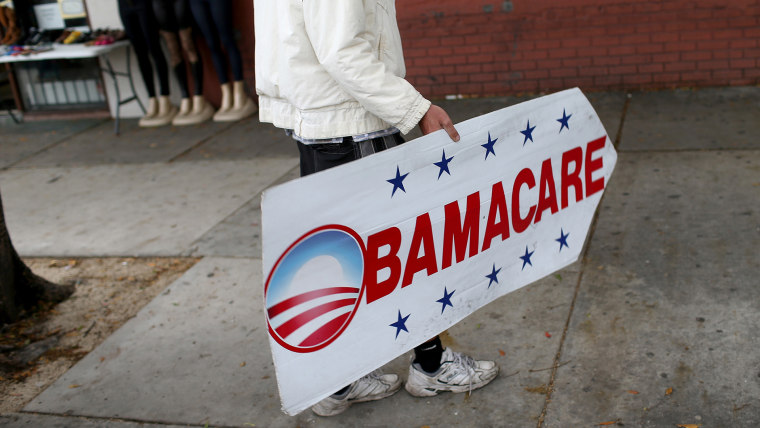We've seen some big news break late on a Friday night, but this one was a doozy.
A federal judge in Texas struck down the Affordable Care Act on Friday night, ruling that former President Barack Obama's signature domestic legislation has fallen down like a losing game of "Jenga." [...]U.S. District Judge Reed O'Connor in Fort Worth sided with the argument put forward by a coalition of Republican-leaning states, led by Texas, that Obamacare could no longer stand now that there's no penalty for Americans who don't buy insurance.
There's a lot to unpack, so perhaps it's best to unpack the developments with a Q&A.
Didn't the Supreme Court already rule in favor of the Affordable Care Act's constitutionality? Twice?
Yes, but the Republican tax breaks, approved last year, changed the policy landscape a bit. As we discussed over the summer, when GOP officials approved their regressive tax plan, they simultaneously zeroed out the health care law's individual mandate penalty. And that, in turn, gave several far-right attorneys general an idea: they could once again file suit against "Obamacare," arguing that the penalty-free mandate is unconstitutional, and given the mandate's importance to the system, the entire law should be torn down.
Did last night's ruling come as a surprise?
That's a matter of perspective. Most objective legal experts considered the litigation idiotic, but the Republicans behind the lawsuit took their case to the most conservative court they could find in Texas, expecting to find a partisan judge who would rule their way. Evidently, that worked.
But Donald Trump said the judge in this case is "highly respected."
Well, Donald Trump says a lot of things. U.S. District Judge Reed O'Connor, a George W. Bush appointee, is known as a fierce ideologue who has "previously blocked Obama-era efforts to extend medical leave protections to same-sex couples and to include gender-identity discrimination as a form of sex discrimination under the health law."
I've heard for months that this case was about Republicans trying to get rid of protections for Americans with pre-existing conditions, but the ruling seems far more sweeping.
Correct. The judge in this case could've ruled against the ACA in a narrower way, but he decided instead to take a sledgehammer to the American health care system, because he felt like it, giving Republicans even more than they expected.
Doesn't that sound like judicial activism?
For many conservatives, "judicial activism" only applies to rulings the right doesn't like.
Can I read the ruling?
It's online here.
Does the ruling make sense?
It really doesn't. Even some conservative legal experts, who've been deeply critical of the ACA, have criticized last night's decision, with one calling it "embarrassingly bad."If the ruling stands, how significant would the implications be?
At the risk of sounding overdramatic, the consequences would be overwhelming. Medicaid expansion would be gone, expanded Medicare benefits would be gone, protections for those with pre-existing conditions would be gone, coverage for young adults on their families' plans would be gone, consumer protections for those who get coverage through their employers would be gone, insurance for millions of families would be gone. This is about ... everything.
There was a worst-case scenario in this case. It was last night's ruling.
Isn't it weird to see Republicans, especially in the White House, celebrate a ruling that would take health care benefits from millions of Americans?
Yes, actually, it is.
My family has health security because of the ACA and you're making me awfully nervous.
In the short term, don't panic. Despite last night's ruling, the ACA is still the law of the land -- in fact, the current open-enrollment period ends tonight at midnight -- and the case will now go to the 5th Circuit Court of Appeals. There's a chance the health care law will end up at the Supreme Court for a third time.
What's likely to happen on appeal?
The consensus among legal experts is that this is a very weak case. That said, those same legal experts thought no judge in his/her right mind would take the last anti-health-care lawsuit seriously, and three Supreme Court justices endorsed it anyway. The high court is even more conservative now than it was a few years ago.
That said, the last time the Supreme Court considered the legality of "Obamacare," it prevailed in a 6-3 ruling. Of the six justices in the majority -- Roberts, Kennedy, Ginsburg, Breyer, Kagan, and Sotomayor -- five are still on the nine-member bench.
What about the political impact?
It's a little too soon to tell. There's a government-shutdown deadline in six days, for example, it's possible Democrats will begin making demands about health care assurances. The policy debate is likely to continue in the new Congress, which will have a Democratic House majority and a Republican Senate majority. The odds of the chambers coming together on a significant, bipartisan health care agreement are not good.
They'll work down the street from a White House with a president who says he wants to strike a deal on health care, but who doesn't know anything about the subject matter, who's been a little too eager to destroy his own country's system without an alternative, and who's never demonstrated any ability to forge bipartisan compromises on controversial issues.
Watch this space.
